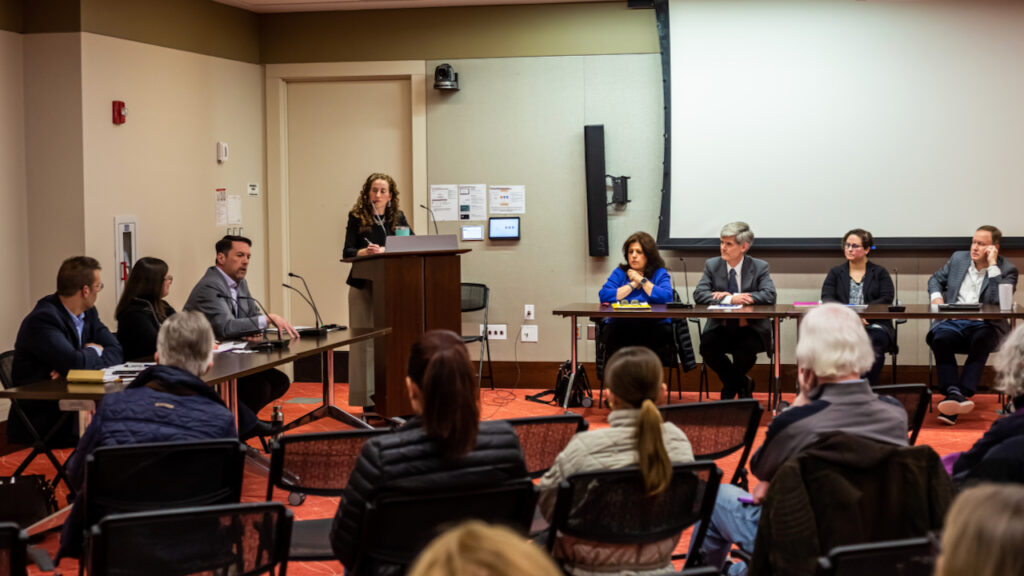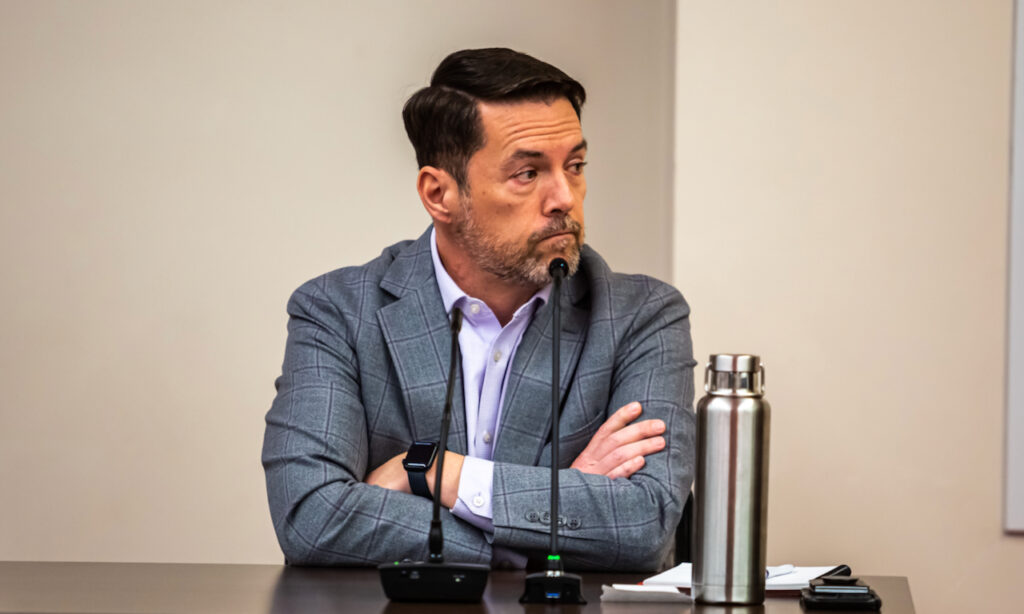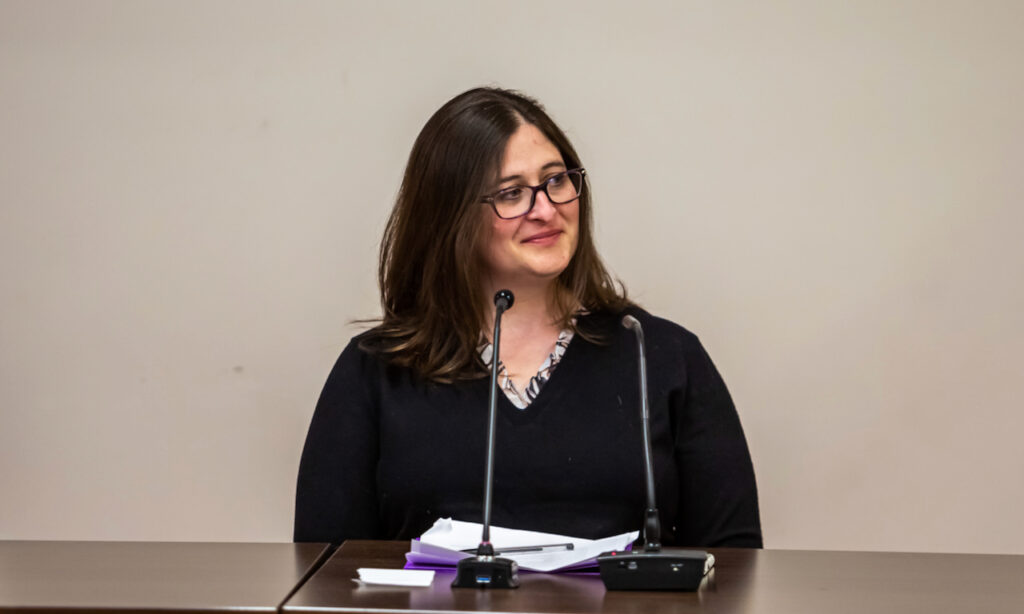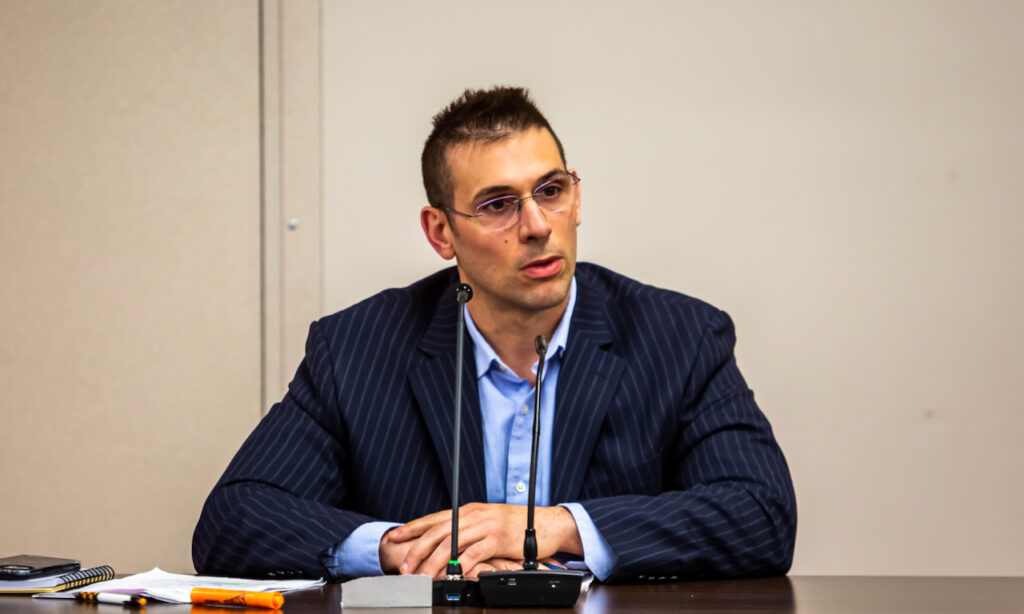Wise, Duragavich, and Guarino Discuss Financial Challenges, Technology Policies, and Vision for Reading Public Schools Ahead of April 8 Election

Reading, MA — In a forum at the Reading Public Library jointly hosted by the Democratic and Republican Town committees this past Wednesday, the three candidates for two seats on the School Committee in the April 8 local election answered questions. They shared why they would like to serve on the committee. Questions posed by Maryanne Downing and Geoffrey Coram ranged on topics such as financial concerns, cell phone use in schools, and artificial intelligence (AI).
Thomas Wise, seeking his third term, has served on the School Committee for six years, two as vice-chair and three as chair. He believes that he has brought positive change to the committee and has been instrumental on issues such as full-day kindergarten, the hiring of the superintendent, and the updating of over forty district policies during his time on the committee. He shared that his commitment to the district is as strong as it has ever been and the committee “has a record of getting things done,” citing issues such as the recently agreed upon district union contracts.

Wise stated that he is concerned over future financial constraints and that he will seek to balance these concerns by increasing in-district special education programs, “investing to save” while seeking to prevent the need for students to be placed in expensive out-of-district programs.
Wise would suggest creating advisory committees to engage with those who are passionate about issues such as cell phone and artificial intelligence use in the schools. He stated that his inclination is not to have cell phones in the elementary schools and that the middle school policy of keeping devices in lockers seems like a sound one, while always considering students that may need devices for certain accommodations.
Wise compared the rise of AI to the rise of the internet thirty-five years ago and would seek the advice and partnership of those in higher education to help create a policy for its use, both by teachers and students alike. Wise would choose to teach a high school data and analytics class or an early-age reading class. “Reading is my passion,” Wise noted.
Laura Duragavich has lived in Reading for ten years, has a Ph.D in anthropology, and is “a passionate advocate for academic excellence.” She stated that she would seek to create policies that enable and encourage the practical skills needed by students in the emerging world. Duragavich would listen to teachers in terms of curriculum needs and invest in personnel in order to “get the biggest bang for the buck” in challenging economic times.

Duragavich believes there are not many good reasons for cell phone use in classrooms but would seek to understand research and data on the topic to help create policies on the issue. She stated that AI use is creating chaos in higher education and that the technology, in terms of use for research, is flawed in many ways, with fifty percent of citations being incorrect. She agrees that the committee will have to think critically about the correct contexts in which AI use can creatively be incorporated into learning and teaching.
Duragavich spoke of an “un-essay” program she uses to help students create content focused on their learning that she believes could drive students towards “deeper learning.” She believes that she will be able to be “a productive and effective member of the committee, bringing an education background that the committee currently lacks. Durgavich stated that she would like to see regular communications to non-parents in town, noting how useful the individual school newsletters are to her. She would teach a middle school or high school literature class if given the option.
Dana Guarino works in sports medicine and grew up in Reading, attending Reading Public Schools. He seeks to give back to the town that fostered his growth and would like to see the current movement towards excellence continue to grow. Guarino referred to himself as a collaborator and a listener who will be able to provide guidance in ever-evolving environments, such as education. He stated that he would like to see the district continue seeking grants that would benefit every learner to offset possible financial issues.

Guarino would seek input from teachers, parents, and students in determining a cell phone policy, stating that he does not think a single policy should be enacted for all levels of the district. However, he affirms that it is a positive thing for students to have time away from their screens. He believes that AI should not be used to perform tasks like writing papers, but understands that it is going to be around and that teaching its proper use in research could be valuable. Comparing it to calculators, he noted that students need to learn to do basic math functions on their own in school despite recognizing that they will likely use calculators for these functions outside of school.
Guarino would like to see communications from the district highlight activities in addition to academics to help these activities become more community-oriented events. If he had the opportunity, he would teach eighth grade math as instruction from his teacher helped him determine his path.
“When you have great teachers, when you have great support, when you have a great superintendent . . . that is what you need to move forward,” Guarino stated in closing while describing himself as “honest, trustworthy, and dedicated.”
Early voting in the local election begins on March 29 at Town Hall during regular business hours, and the election will conclude on April 8 at the Hawkes Field House. Polls open at 7:00 am and will remain open until 8:00 pm.
